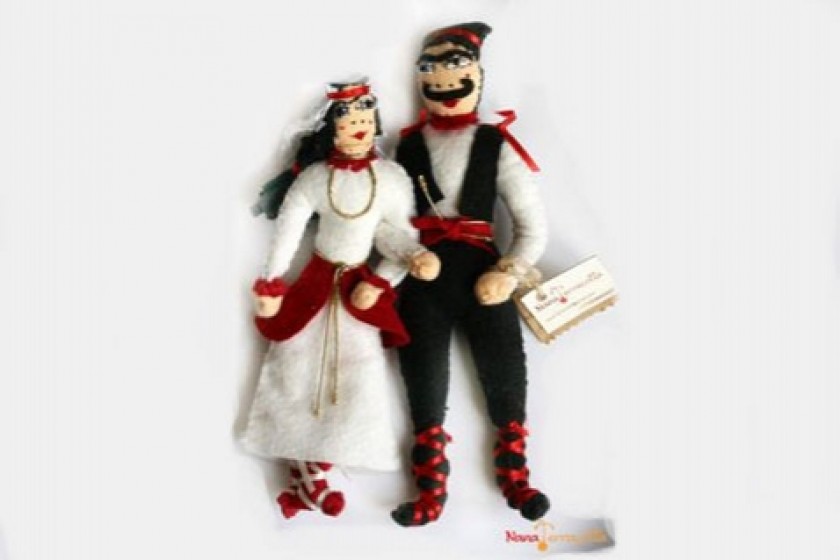
Of Love and Marriage and Sex
By Marineh Khachadour
Poetry is often a subtle expression of most poignant feelings and thoughts of not only the author but of the society and the culture to which the author belongs.
In one of his poems "Vazn e Lalis" (The Grapevine Weeps), Vahagn Davtyan makes the most beautiful analogy between the ripeness of a cluster of grapes on a vine to the ripeness of the desire for motherhood in a young woman's heart.
Reading the poem, I can identify with the sentiments and find the poetic language he uses beautiful. As a woman, my heart sinks for a moment with the familiarity of the feeling all women have at a certain time of month when the moon pulls the strings on a woman's psyche and physique. Then there is nothing a woman can do but let the tears go to relieve the pressure that builds in the body, mind, and soul in preparation to welcoming life. Sometimes it is physically painful, and often life does not take hold. Her body aches; her soul whimpers. The pressure needs to be released. Thus, the tears, an integral part of a woman's sexuality.
I keep reading, and my mind draws images of a lover pecking the teardrops off his beloved woman's face much like one would pick the fruit from a cluster of grapes one by one. How much more romantic and sexy can it get? Armenian culture is saturated with both. Why else would there be a park in the heart of the Yerevan dedicated to "lovers" since a time my grandmother could remember? Why else would bus drivers publicly display images of naked women, cutout from “Playboy”, on their dashboards blatantly crossing the boundaries between sex and porn?
Armenians, men and women, are sexual beings like all humans. Vahagn Davtyan, however, attributes the young woman’s crying to her need and desire to become a bride. He uses the phrase harsnanalouts araj (before getting married).
I sigh in disappointment knowing that the only way for a woman to become a hars (bride) is through marriage. Many marriages are romantic and sexy at least until the honeymoon is over, but in essence, a marriage is a transaction of economics between sides – couples, families, clans - often with one of the sides in charge. In patriarchal societies, it is the groom’s side. The author clumps together the natural phenomena of a woman's monthly experience of her sexuality with the social construct of marriage. The first one is shameful and taboo in Armenian culture, the latter is embellished with the socially sanctioned bridal gown, and the crown, the groom, and the prospect of a child, preferably a male, for the bridegroom and his clan.
In this poetic imagery, the author has chosen to circumvent a young woman’s sexuality by attributing her whimpering to her feeling excitement and joy in anticipation of marriage. The poet is keenly aware that until that "sacred" moment, she is expected to deny a part of her being that has desires and passion for physical, emotional intimacy with another. Only after marriage she will have a license to embrace the sexual part of herself and will become whole at last.
What the author avoids to acknowledge is that missing a part of herself in order to satisfy societal expectations is a valid reason for a young woman to shed tears. Instead, he chooses to romanticize it. This poet's language speaks volumes about the contradictions in Armenian society and its values especially when it comes to women and sexuality.
I can go on making excuses and arguments about the sanctity of marriage and family as the cornerstone of Armenian society. However, the woman and the mother in me scream for the society to acknowledge the image of Armenian women in its wholeness, complete with sexuality and not only as commodity that can be exchanged to benefit the dominating archaic patriarchal structures.
Young women need to experience romance, love, and sex not just marriage with all of the joys, messiness, and complications that life withholds at a developmentally appropriate age. They need their fathers, brothers, male friends to respect them as the real living breathing sexual beings they are and not just the poetically constructed, incomplete images of them.
Marineh Khachadour is an educator, writer, researcher working in a public school in Pasadena, California. She lived in Armenia from 1992-1998. During that time she provided educational services and resources for Armenian women and children including refugees and served as Gender in Development Expert with UNDP, Armenia from 1995-1998.
 Videos
Videos Photos
Photos
Comments (1)
Write a comment